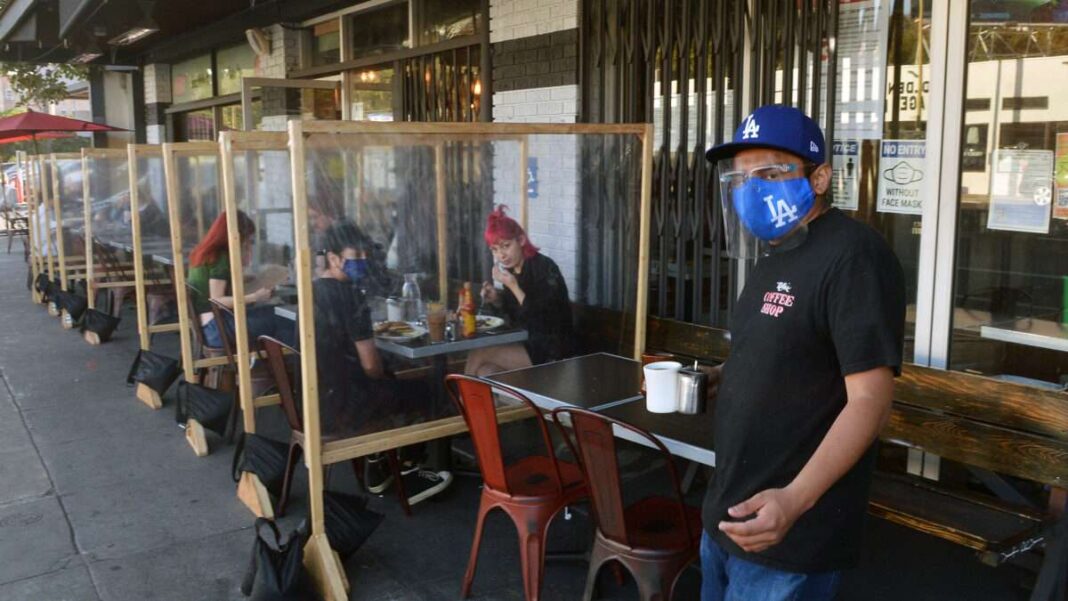Los Angeles is ending the city’s successful Covid-era outdoor dining program. City officials have proposed to replace it with a new ordinance that’s being called costly, onerous, and potentially disastrous for restaurants.
“The city of Los Angeles’ pandemic-inspired al fresco dining program—which saved many restaurants from closing—is going away,” Los Angeles CBS affiliate KCAL reported last week. “Councilmembers hope that a proposed city ordinance will take its place. However, some restaurants are concerned about the costly new regulations.”
Indeed, that proposed ordinance would create new costs and add “additional red tape” for restaurants still struggling (at best) in the face of several factors, including food inflation, worker shortages, high rents and minimum wages, and shrinking consumer budgets.
After indoor dining was banned or limited in many places during the early days of the Covid pandemic, many cities helped to keep restaurants afloat by allowing them to create covered outdoor dining structures. The benefits of L.A.’s program (and others), ABC7 explained in a recent report, is that it came “without the usual paperwork, bureaucracy, fees and months of applying.” Thousands of restaurants and bars in Los Angeles took advantage of the program.
While L.A. city planners say the program “inject[ed] a new vibrancy and energy into our commercial corridors,” it also—very unfortunately—”resulted in a desire and direction from the City Council to establish an Al Fresco program beyond the temporary emergency program which will reimagine outdoor dining regulations.”
That proposed reimagining includes, among other new requirements, “differences in the minimum distance between outdoor dining and a residential zone, the maximum number of parking spaces that may be displaced by outdoor dining, hours of operation, and allowed location of outdoor dining.” One can almost feel the “new vibrancy and energy” evaporating.
The new regulations are also expected to include requirements that restaurants that created outdoor spaces on their property “to reapply and go through the right channels to keep these patios open,” KCAL reports. All told, it means even small restaurants will likely be forced to pay tens of thousands of dollars to keep their outdoor spaces open.
Restaurateurs, diners, and editorial boards alike are speaking out against the proposal.
Tyler Wells, a chef and restaurateur in Los Feliz, told the L.A. Times last week that if he won’t or can’t afford to comply with the new regulations, he’ll lose 30 seats and have to fire staff.
Christy Vega, who owns Casa Vega, where I dined last year—opting, despite the pleasant weather, to sit indoors at the Cliff Booth booth—told KCAL she already spent hundreds of thousands of dollars to improve her outdoor dining space, and that she feared the new regulations would cost her six figures more.
“Right now, L.A. City is proposing an ordinance that would kill outdoor dining,” says Vega, a leading voice among restaurateurs in California.
Los Angeles isn’t alone in turning against outdoor dining. Covid-era rules that facilitated outdoor dining have come under attack in other cities—including New York and Boston. As I’ve explained, many of the complaints critics in those cities (and others) have lodged against expanding outdoor dining—that it fosters noise, litter, and vermin—don’t withstand scrutiny.
Other cities have recognized that fact. Seattle, where I live, opted to make the city’s highly successful outdoor dining plan permanent. Stroll along Ballard Avenue on any given evening or weekend, for example, and you’re sure to see happy customers dining al fresco in wooden structures placed streetside in front of at least a dozen or so restaurants.
For restauranteurs in Los Angeles who spent already scarce money during the pandemic to build expensive outdoor structures and take advantage of the outdoor-dining lifeline during Covid’s darkest days, L.A.’s stance now seems needlessly cruel. It also appears likely to strangle many of the same businesses the dining program was intended to and did help save—particularly small, independent restaurants.
“The program that essentially helped to save many restaurants during the pandemic would become something of a financial and operational burden,” Eater L.A. reports.
That would be both pointless and a shame. Outdoor dining programs have been a resounding success. During Covid, Los Angeles, like other cities, showed “the usual paperwork, bureaucracy, fees and months of applying” for permission to host diners in outdoor spaces are unnecessary. Instead of going backward, Los Angeles should make that change permanent.





